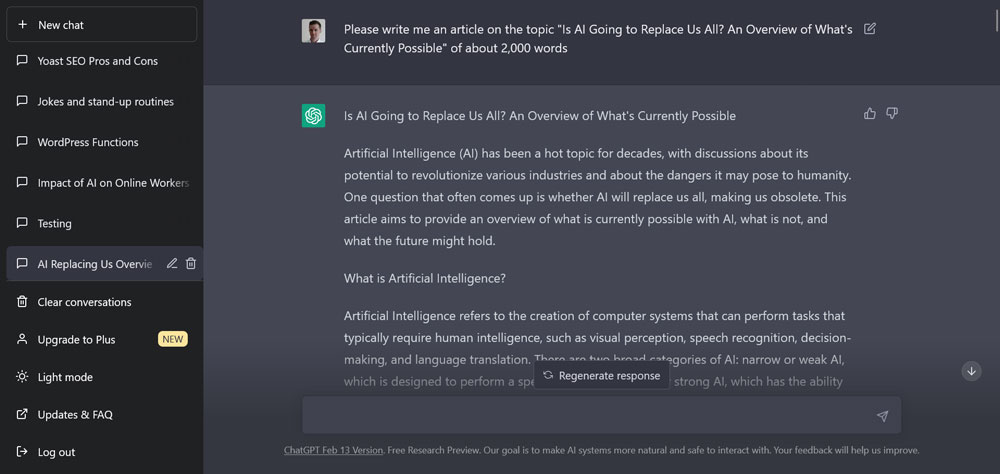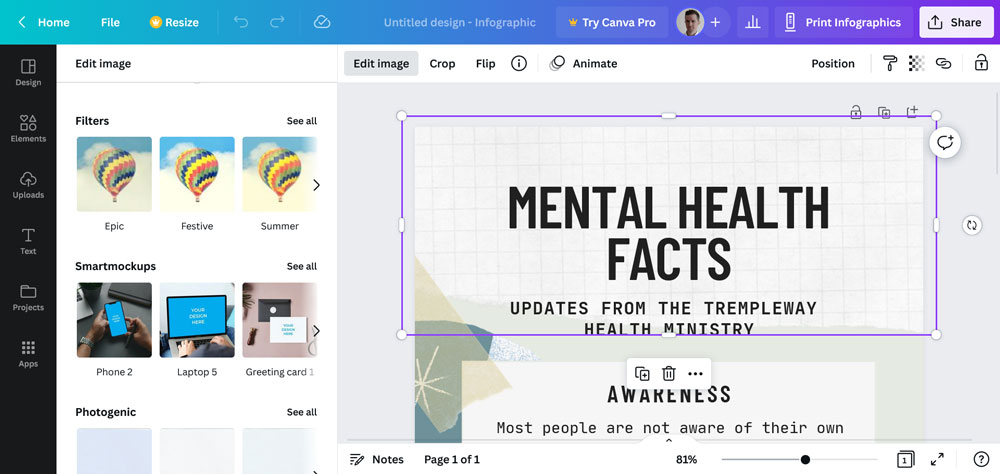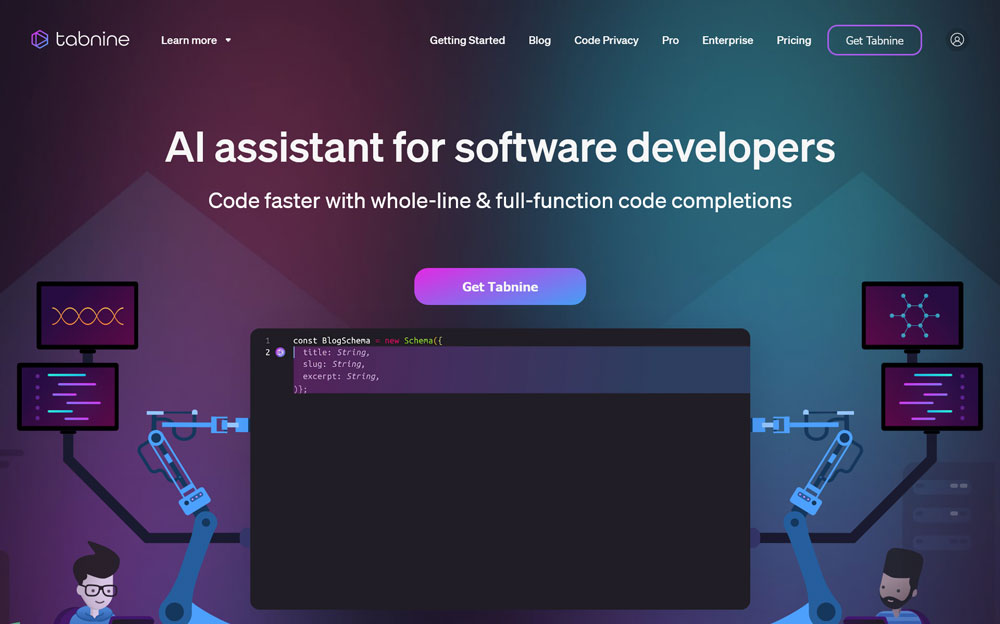Thanks to ChatGPT, artificial intelligence has been allover the news as of late. Many people are fascinated by the chatbot’s ability to communicate, relay information, and even write poetry. At the same time, it raises the old question whether AI will replace us all in the near future.
Seriously, look at Google. Pretty much all its autosuggestions are of the “will AI replace X” nature.
After being talked about as the next big thing for years, it seems like artificial intelligence has finally arrived in the mainstream — and very suddenly. Does this mean the great labor displacement that experts have been warning of is imminent?
In the case of ChatGPT, that’s especially relevant for people like me. Do you still need human writers to create content? Or will I soon find myself without a job because robots have replaced me?
To find an answer to these questions, in this article we take a detailed look at the current state of artificial intelligence. To that end, we also cover AI tools that are already available for website owners and marketers. In addition, naturally, I tried to have ChatGPT write this article for me in order to get first-hand experience. Learn how that went and my thoughts on the process below as well.
What is AI and How Will It Shape Our Future?
Artificial Intelligence is a rapidly growing field that experts say has the potential to transform nearly every aspect of our lives. At its core, AI is about creating machines and algorithms that can perform tasks that normally require human intelligence. Examples include recognizing patterns, making predictions, and learning from experience.

AI is not a new field. However, recent advances in machine learning, big data, and computing power have dramatically expanded its capabilities and potential applications. In the coming years, it is expected to become increasingly integrated into our daily lives.
What Can AI Currently Do?
Already there are numerous examples of AI applications in various industries. Some of the most well-known include:
- Virtual assistants: Apple’s Siri and Amazon’s Alexa use natural language processing to understand and respond to voice commands.
- Image and speech recognition: Artificial intelligence is used security systems and smartphone cameras to identify faces and objects but also in radiology to spot tumors.
- Self-driving cars: Here, artificial intelligence navigates roads and makes decisions based on real-time data from sensors and cameras.
- Fraud detection: Machine learning algorithms help to identify and prevent fraudulent activity in financial transactions.
- Translation: Translation services like DeepL and Google Translate use deep learning networks to improve their capabilities.
How About Websites and Digital Marketing?
You have probably heard about at least some of the above before. However, what about AI usage for website owners, bloggers, and marketers? After all, those are the people (me included) asking if AI will replace us. Well, for now, we can take advantage of it in various forms as well.
Content Creation

AI can help generate new ideas and content, such as article summaries or social media posts. Besides ChatGPT, there are Articoolo, Copy.ai, and Jasper.ai. There is also the CoSchedule Headline Analyzer for writing better blog headlines and MarketMuse for improving the quality and relevance of your content.
Editing and Proofreading

AI can assist with tasks such as grammar and spelling correction, making it easier to produce error-free content. Grammarly is a well-known example for that. However, even Google Docs now gives you input on grammatical mistakes and punctuation.
Marketing and Advertising

Artificial intelligence can analyze data to identify patterns and make recommendations for advertising strategies to reach your target audience more effectively. For example, Hootsuite and SEMrush both use AI to help their customers improve their social media marketing and SEO efforts.
Graphic Design

AI-powered tools such as Adobe Express, Canva, and Piktochart use algorithms to help users create graphics and images. They offer templates and other design elements to help users create appealing visuals with minimal effort and can also suggest things like color schemes and font combinations.
Development

AI-powered tools such as Tabnine, and DeepCode use algorithms to help developers write code faster and more efficiently. These tools use machine learning algorithms to suggest code snippets, complete code blocks, and even generate entire applications.
Customer Service

These days it’s very likely that at least part of your interaction with a company’s customer service will be handled by a robot. Tools like Intercom are able to answer common questions or resolve simple issues using machine learning.
Job Search

AI-powered job search engines such as Indeed and Hired use algorithms to match job seekers with suitable job postings. These platforms use data such as the user’s skills, experience, and job preferences to match them with relevant job opportunities.
Besides the examples above, artificial intelligence is also running in the background of many things we do online. For example, in the past we have talked about RankBrain. It’s a machine-learning algorithm that is involved in every search done Google.
In short, AI is already in the process of taking over. There are more and more areas in which it plays a role. Does that mean it’s game over? Is it only a matter of time before we are all expendable?
What AI Cannot Do (Yet)
While artificial intelligence has made great strides in recent years, there are still many tasks that it cannot perform. For example:
- Empathy and emotional intelligence: At this point, AI is not capable of truly understanding human emotions or empathy. Although, some are getting close enough it seems. Just ask that Google engineer who got fired for proclaiming their AI chatbot had gained consciousness.
- Creativity: AI can generate creative outputs in some areas, such as music or visual art. However, it is not capable of truly original thought at this point. While it’s great at recognizing and reproducing patterns, it’s not very good at doing things outside of its known realm.
- Common sense: AI does not possess the same level of common sense as humans. This can lead to mistakes in decision-making.
- Humor: Case in point, I had ChatGPT tell me some jokes and write a stand-up routine and, well, let’s just say that the AI won’t replace professional comedians any time soon.
Most of AI’s weakness come from the fact that it can’t have any actual experience. Its knowledge is based on the amount of data that it can parse, which it can bring into a form that makes sense to us humans. However, it possesses none of the other stuff and nuances that makes up human intelligence.
I Had AI Write Parts of This Article, How Did That Go?
Naturally, to welcome our robot overlords, I tried to outsource the writing of this article to ChatGPT. Hey, if an AI machine is going to replace me, it might as well be my decision. Plus, I wanted to get some first-hand experience for what it can do (and also find out if I have to update my resume for a career change).
How ChatGPT Was Helpful
Let’s start off by saying that what ChatGPT can do is no doubt impressive. Its language processing is good enough to make talking to it very similar to chatting to real-life human being. Plus, its ability to write poems on any topic and generally generate written content is mind blowing.

Of course, the thing that I was most interested in was its skill to write blog articles. Well, it definitely can. The machine is really fast at compiling information and putting it into text, definitely faster than I can do research.
In addition, ChatGPT is good at formatting, too. It uses a lot of bulleted lists and paragraphs in what it produces, making it pleasant to read. Theoretically, you give it a prompt and what it delivers is ready to publish.
Plus, its capabilities don’t just extend to text. It even created some WordPress PHP functions for me and is versed in other programming languages.
What Isn’t That Great (Yet)
At the same time, I also ran into a bunch of issues while trying to outsource my job.
Need for Specificity
Honestly, what I found most difficult was to write a detailed enough prompt so that the machine would produce an article like this. And I am not talking about this current part, where I talk about my personal experience. Naturally, the AI could never replace that. However, even for more generic information, it was up to me to add extra depth.

Inflexibility in Writing
ChatGPT seems to look at topics from only one angle. Even when rewording or amending my prompt, it oftentimes provided something quite similar to what it wrote before. Its knowledge currently seems a bit too narrow to cover the true range of certain topics.
Important Parts Missing
Blogging and content creation is more than just text. The AI didn’t deliver any links, nor visuals to make the content more appealing and support its claims. In fact, I can’t really say where it gets any of its information and if it’s trustworthy. Case in point, a number of the AI-powered tools it proposed as examples no longer exist, which I only found out because I checked manually.
Incorrect Code
Yes, ChatGPT can write code and, as far as I could tell, it was semantically correct. However, what it was often missing is context. For example, I tried to have it write a function to dequeue Google Fonts on a website, which it did. However, naturally it dequeued a function that didn’t exist on the site in question, so I wouldn’t be able to use it without making adjustments.

Uneven Language Quality
While the AI can create text, that doesn’t mean what it produces is ready to go. Case in point, when I simply copied an entire article verbatim into the WordPress editor, I got a red light in Yoast’s Readability score. In addition, it can get a bit repetitive. Look at the screenshot below where many of the entries have basically the same description.

Overall Verdict
So, what do I think of ChatGPT as blog writing tool? At this point, I would view it as a useful tool only for augmenting your writing. The AI is quite a bit away from being able to fully replace a writer, in my opinion.
How much of this post was written by the chatbot?
I would estimate that ten to 15 percent of the post come pretty much straight from ChatGPT. Content wise, it also had its hand in maybe 40 percent of what is on the page. That means, I used it for research but heavily rewrote or amended what it delivered. Is that much or little? I am not sure.
Did it make me faster or my life easier? Yes, somewhat.
I can definitely see how it can take over some parts of the work so that I can concentrate on the higher level stuff. That’s especially when it comes to relatively thin content, like information that is generally known and just needs to be put into text form (e.g. “what is AI and what are current real-world applications of it?”).
At the same time, for more in-depth pieces that need a lot of thought, sources, and insights, I don’t really see ChatGPT writing those yet. In addition, it didn’t make me significantly faster. When I look at the tracked time for articles I have written in the past twelve months, this one is slightly above average in terms of time it took me to complete.

That is a bit surprising since, after all, that’s one of the main promises of AI. Of course, it’s also entire possible that, if I had more practice in writing prompts for it, ChatGPT would do a lot better. I need to run more tests for that, I can’t say one way or another at this point.
So, Will Artificial Intelligence Truly Replace Us?
AI is a rapidly evolving field, and its potential impact on society is a matter of debate. Already today, we can see how it is making its way into our lives. This includes AI-powered applications for website owners, bloggers, and online marketers, which have existed since before ChatGPT became the talk of the town.
Yet, while artificial intelligence has the potential to improve efficiency and productivity, there is still much that it cannot do. As my test above has shown, at this point, it is great as an aid that can speed up certain parts of content creation. However, in my humble opinion, we are not at the point where the AI can fully replace a human writer. If and when that happens in the future is something we will just have to see.
For now, however, I think it still makes sense to see how AI tools can aid the writing process and stay in the loop about the direction this development takes. Because one thing is for certain, artificial intelligence is here and it won’t go anywhere.
What’s your view on the impending AI revolution? How do you think artificial intelligence will impact website owners and marketers in the next few years? Please share your perspective in the comments below.


2 Comments